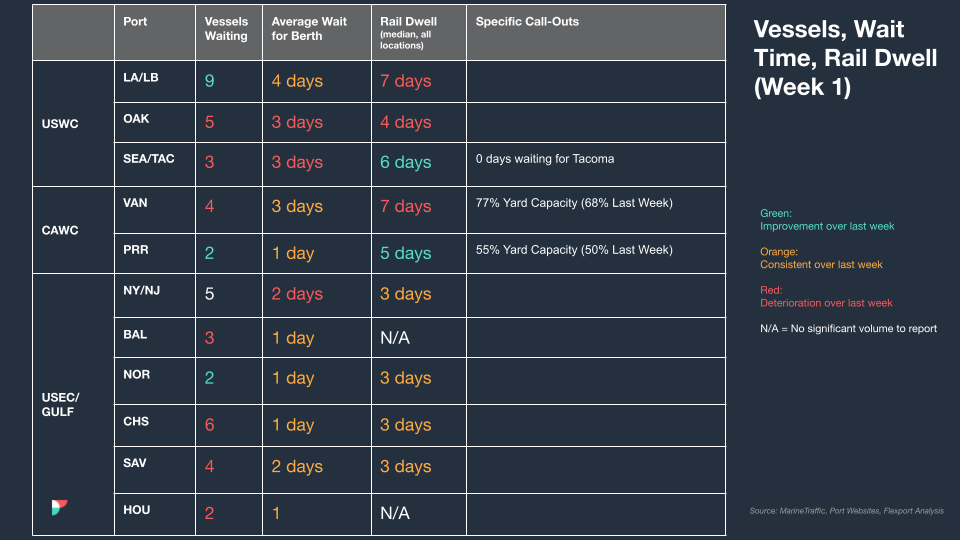Market Update
Freight Market Update: January 10, 2024
North America vessel dwell times and other updates from the global supply chain | May 17, 2023
Freight Market Update: January 10, 2024
Welcome to the first edition of the Freight Market Update in 2024! This week, we’re bringing you a special edition packed with RFP content to help your business prep for the 2024 RFP season. Check out these helpful resources to get a head-start on the planning process:
- Kick off RFP season with two webinars from Flexport: A Beginner’s Guide to a Successful RFP on January 17 or An Advanced Guide to Upscaling Your RFP on January 23.
- Explore our 2024 RFP Preparation Hub to access go-to resources including blog posts, e-guides, and videos for planning a successful 2024 RFP.
- Whether you're experienced with RFP processes or running one for the first time, you'll want a partner who helps you prepare for unexpected supply chain situations and strategically pivot as soon as they happen. Download our e-guide, How To Run A Value-Driven RFP, for insights on what to look for in a provider and key questions to ask throughout the entire process.
- Looking for one-on-one support when planning your RFP? Talk to one of our supply chain experts today.
Trends to Watch
- [FEWB - Ocean] Asia-North Europe: Market demand is increasing in January and all ships are filling up. Spot rates for the second half of January are expected to continue to increase due to the Lunar New Year rush and the Red Sea threat. Transit times for vessels rerouting around the Cape of Good Hope are currently 2-4 weeks (round trip) depending on the ship’s final destination. Hence, there will be more blank sailings expected in February coupled with a spot rate level similar to January, as equipment shortages can be expected. In other news, German railways will face a strike again from January 10 through January 12. The strike of the Trade Union of German Locomotive Drivers GDL is planned as follows:
- GDL members at Deutsche Bahn AG, Transdev, and City Bahn Chemnitz have been asked to stop work from January 10, 2024 at 2 AM to January 12, 2024 at 6 PM. The work suspension at DB Cargo begins on January 9, 2024 at 6 PM.
- Most rail carriers and their drivers are not organized in the GDL, but as the infrastructure is also affected, consequences are not known at this stage, but interruptions are to be expected. We also anticipate there will be an additional Demurrage / Detention charge incurred between January 10 and January 12, affecting deliveries in weeks 3-4 (if the strike does not extend beyond January 12). However, if the strike goes further, larger interruptions (and affected areas) can be expected.
- [MED Trade - Ocean] Following North Europe, MED spot rates for the second half of January are climbing up due to similar reasons as North Europe trade.
Please reach out to your account representative for details on any impacts to your shipments.

For more details, please visit Flexport’s Ocean Timeliness and Air Timeliness indicator pages.
Upcoming Webinars
European Freight Market Update Live | Tuesday, January 16 at 15:00 GMT / 16:00 CET
Navigating the 2024 RFP Season: A Beginner’s Guide to a Successful RFP | Wednesday, January 17 at 10:00 AM PT / 1:00 PM ET
North America Freight Market Update Live | Thursday, January 18 at 9:00 AM PT / 12:00 PM ET
Navigating the 2024 RFP Season: An Advanced Guide to Upscaling Your RFP | Tuesday, January 23 at 11:00 AM PT / 2:00 PM ET
This Week In News
The Red Sea Attacks Are Throwing Supply Chains Into Chaos — But U.S. Oil Exports Appear To Be Benefiting From Them
The situation in the Red Sea has resulted in a notable increase in U.S. petroleum exports, rising by 35% on-week to nearly 5.3 million barrels a day for the week ending December 29, according to the U.S. Energy Information Administration. Analysts anticipate that U.S. petroleum exports will continue to surpass 5 million barrels a day amid escalating geopolitical tensions in the region. The U.S., leading a multinational effort to protect shipping lanes in the Red Sea, is positioned as a safer and cheaper alternative for oil buyers compared to the Middle East.
NY Fed Says Global Supply Chain Pressures Eased in December
The Federal Reserve Bank of New York reported a cooling of supply chain pressures in December, with its Global Supply Chain Pressure index dropping to -0.15 from November's 0.13. The negative reading indicates below-normal supply chain pressures, potentially contributing to decreased inflation pressures. Despite supply chain issues being a key factor in the inflation surge during the early stages of the pandemic, the Fed has seen a decline since December 2021. However, recent challenges in shipping routes, geopolitical factors, and a reversal in supply chain pressure indicators, including increased air and shipping freight costs, raise concerns about potential future disruptions.
Extreme Weather Tops List of Possible Logistics Disruptions in 2024 Forecast
According to Everstream Analytics' "2024 Supply Chain Risk Report," wild weather events are predicted to be the primary disruptor for logistics in 2024, with the "Era of Extremes" exacerbating the impact of hurricanes, winter storms, wildfires, and floods on supply chains. The report also identifies five other looming threats: increased administrative burdens and costs due to environmental regulations, trade war tensions between the U.S. and China affecting semiconductor sourcing, rising geopolitical instability centered around Taiwan, commodity shortages driven by various factors including extreme weather and protectionism, and the persistent risk of cybercrime, particularly ransomware and data breaches, continuing to threaten supply chains in 2024.




